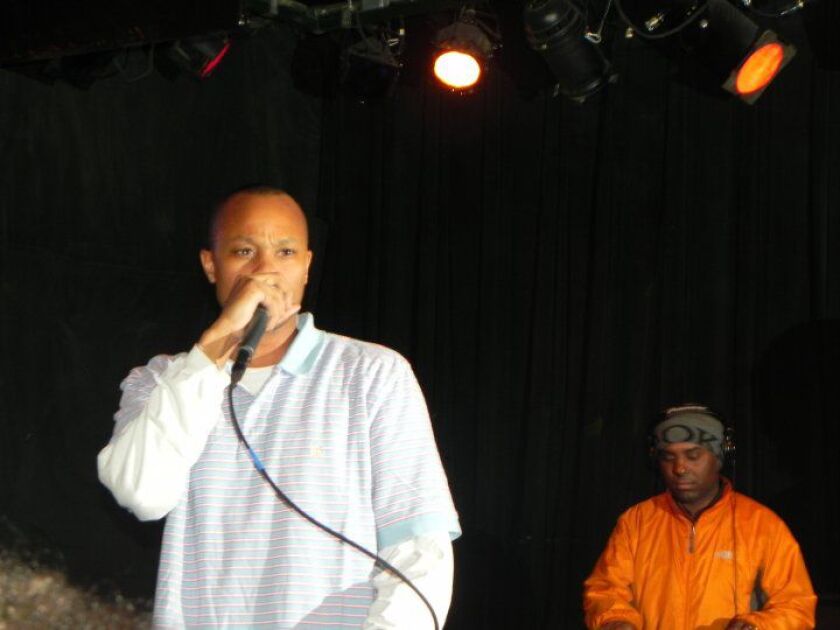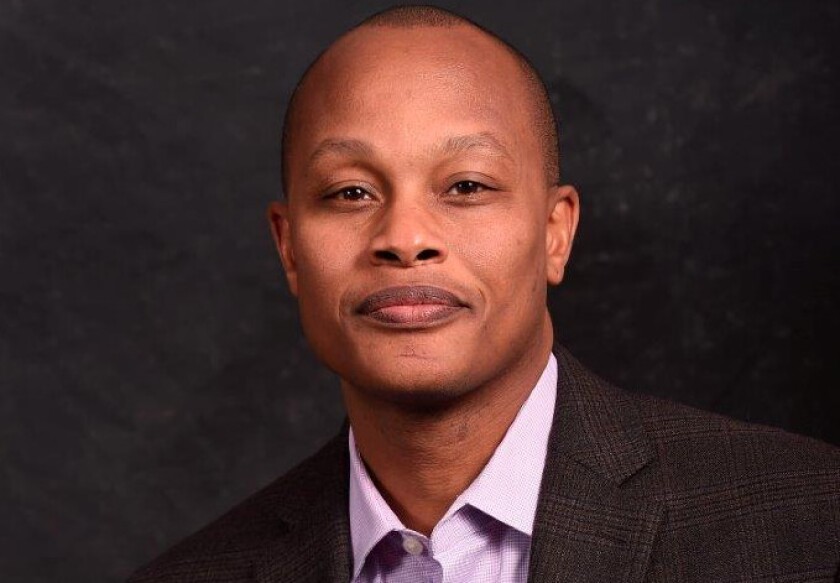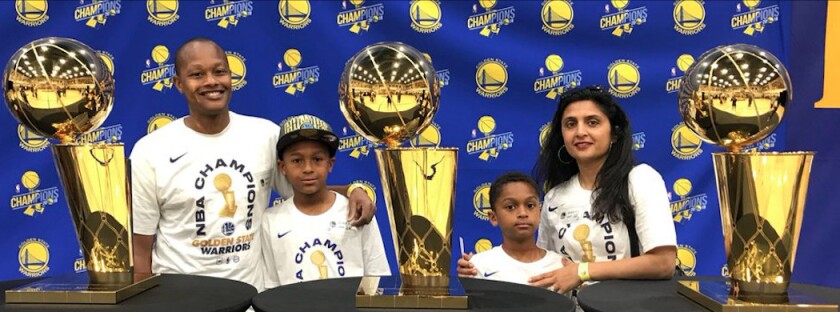David Kelly has a lot going on.
As the Golden State Warriors’ chief legal officer, the Flossmoor native has a wide range of responsibilities, including managing the team’s salary cap and overseeing the construction of a new arena in San Francisco.
Before working in the Warriors’ front office, Kelly was largely known as Capital D, or Cap D, a founding member of the seminal Chicago hip-hop group All Natural. Somehow, as the team vies for its fourth NBA title in five years, the rapper-turned-lawyer has found time to record his first new album in nearly a decade.
“The plan is to put it out sometime by the end of the year,” Kelly told the Chicago Sun-Times.
Since the late-90s, Kelly has released four solo records and four others with the group, which also features his childhood friend and DJ Tony Fields, or Tone B. Nimble. His music garnered a dedicated following and stellar reviews in Chicago and beyond, but he failed to score a breakout hit.
When Kelly released his most recent solo LP in 2010, he was at a crossroads. By then, he had graduated from the University of Illinois Law School and taken a job as a low-level associate at the powerful Chicago-based firm Katten Muchin Rosenman.
“In some respects I felt like I needed to put [music] on the back burner because I needed to be fully engaged at the law firm,” Kelly told the Chicago Sun-Times. “It was kind of like walking in two directions at the same time and not trying to give up on one while you’re walking in the other.”
Over the years, Kelly has become a master of juggling his seemingly-conflicting identities.
In the mid-70s, when Kelly was around 6 years old, his family left the South Side for Flossmoor, then a predominantly-white enclave just south of the city. The move presented opportunities, like better schools and sports programs, but also exposed Kelly’s black family to bold-faced racism, including an incident in which someone spray-painted the n-word on their driveway.
As the village’s demographics shifted and Kelly met a racially-mixed group of friends, his identity started becoming intertwined with the diverse music he was being exposed to. His embrace of rock acts — like U2, Devo and The Police — came as he was delving into the early hip-hop records that first inspired him to rap.
“I was always someone who didn’t fit whatever the typical mold was,” Kelly said. “I was a black kid growing up in Flossmoor who was into hip-hop and basketball and punk rock. So always different identities.”
“For me, it’s always been about seeing what the commonalities are between these things that seem to be disparate,” he added.
When Kelly eventually started making his own music in high school, he found himself at the center of a local culture war. At the time, house was a dominant force in Chicago, where the groundbreaking electronic music genre was birthed and has been endlessly reinvented.
Amid a growing divide between “house nation” and local hip-hop fans, Kelly was experimenting with both forms. At one point, the vaunted Chicago house label Trax Records even offered him and two friends a record contract they decided not to sign.
“There was definitely a perception that, you know, how dare you like house music if you’re into hip-hop and vice versa,” Kelly said. “But, I was like, whatever. I liked them both.”
Ultimately though, Kelly decided that he had to “silence that house urge” and whole-heartedly embrace hip-hop culture.
“Your test of how authentic you are, in terms of being a hip-hop head is, you can’t like house as well,” he said. “I think a lot of us let that seep in a little bit more than we should have.”
In the ensuing years, Kelly emerged as a unique figure in Chicago hip-hop. While his raps were always reflective and philosophical, his conversion to Islam in 2000 prompted a noticeable shift in his songwriting. In addition to imbuing tracks with religious messaging, Kelly also began making bold political statements.
“He’s always gonna have something to say that isn’t just creative writing,” said Fields, All Natural’s DJ, “There’s a purpose or message that he’s trying to convey.”
On his latest solo effort “PolyMath” — which was named the best independent Chicago album of 2010 by Greg Kot, the revered Chicago Tribune music critic — Kelly included a sample of former U.S. Attorney Patrick Fitzgerald announcing the indictment of Jon Burge, the disgraced former Chicago police commander who was accused of torturing hundreds of suspects.
“We living in the belly of the beast where they feast on the weak like some quiche,” Kelly raps on “Chicago Five-O,” a track that vividly details a culture of police misconduct and abuse.
Despite the critical reception, Kelly had already started to shift his attention to his legal career. That included working on Katten Muchin Rosenman’s accounts with the White Sox and other professional sports teams.
The same year “PolyMath” was released, the Warriors hired the firm to close the sale of the team to its current owners Joe Lacob and Peter Guber. Within a few years, Kelly was tapped as the team’s general counsel and vice president of basketball management and strategy.
Warriors President and Chief Operating Officer Rick Welts said Kelly has grown into an “absolutely invaluable” part of the organization.
“For me personally, he’s in my small group of people that I go to to seek advice, not necessarily legal advice, on any subject relating to the Warriors,” Welts said. “He’s turned into, not only a great lawyer, but also a great business executive, where he’s able to really help our whole senior team chart a course for success for our franchise.”
Still, as his role within the organization continues to expand, Kelly has never put down the mike.
His new album serves as a return to form. Panik, a longtime collaborator and member of the famed Chicago collective the Molemen, produced all the songs, while Juice, the razor-tongued spitter who once beat Eminem in a storied battle in 1997, appears on one of the tracks.
“This is what you would expect 25 years ago,” Kelly said. “It sounds modern but it’s the same team.”








